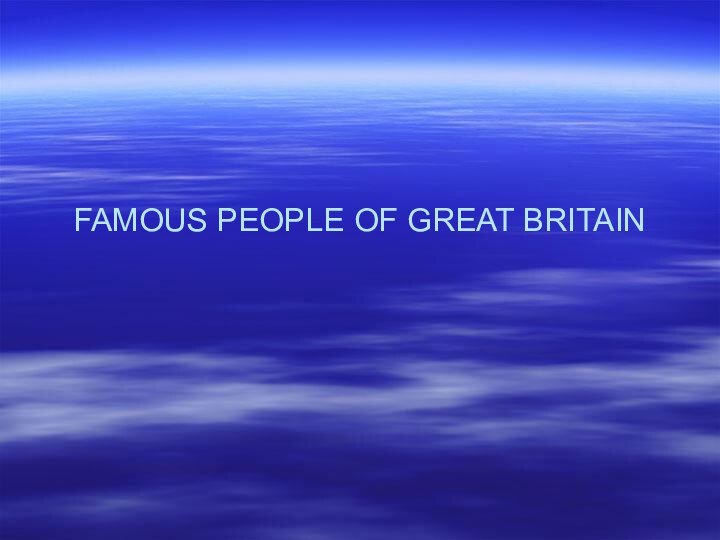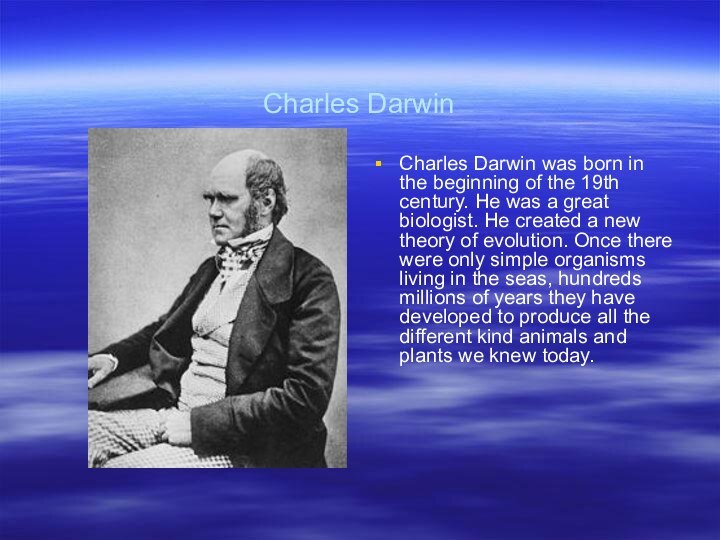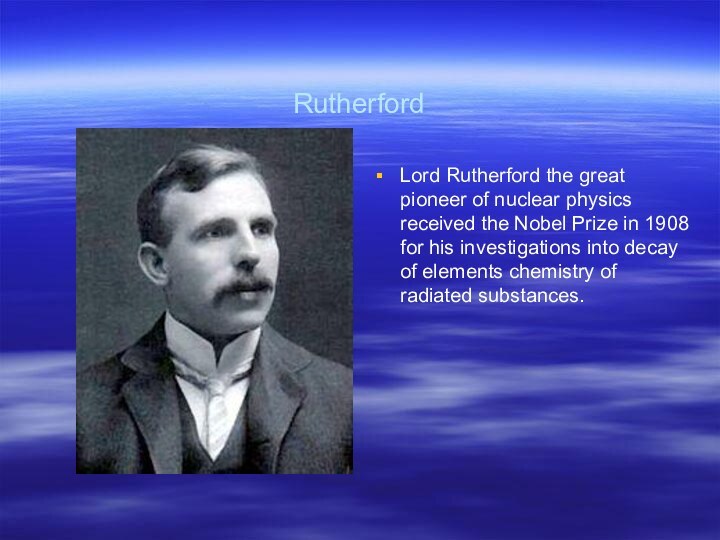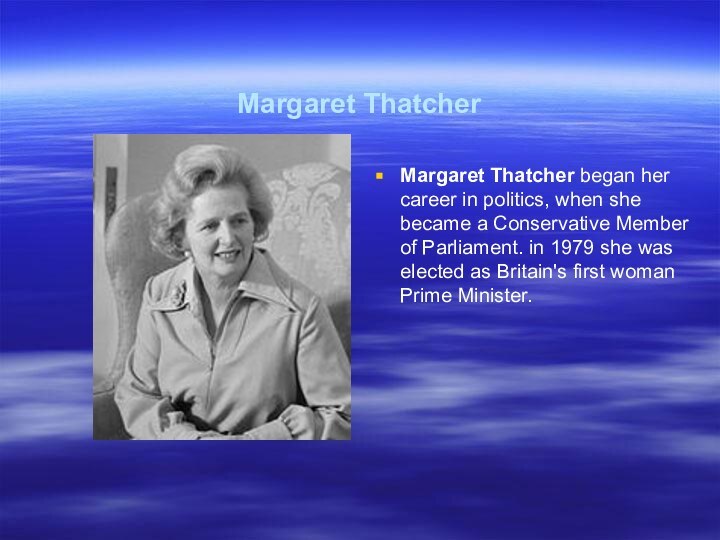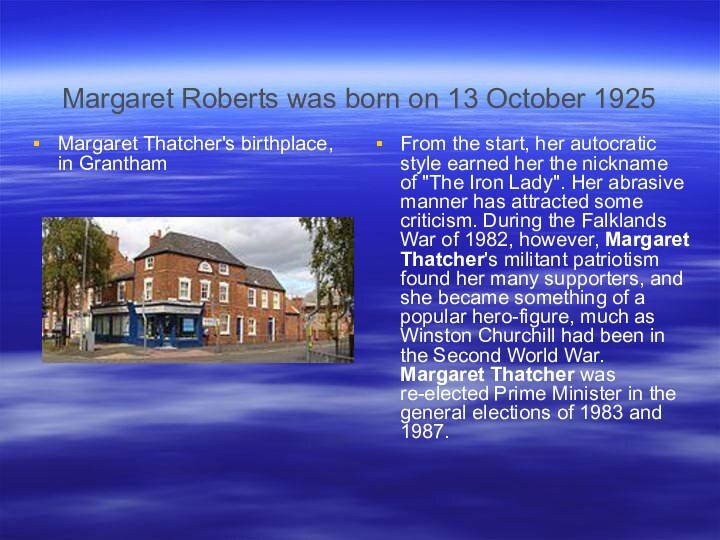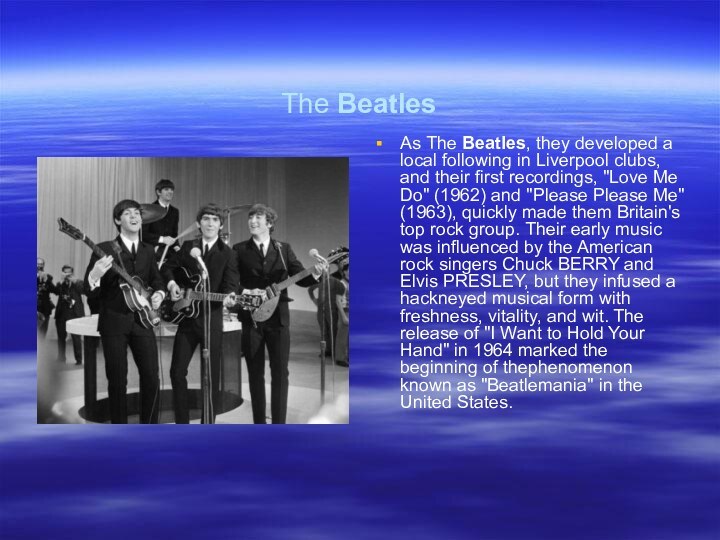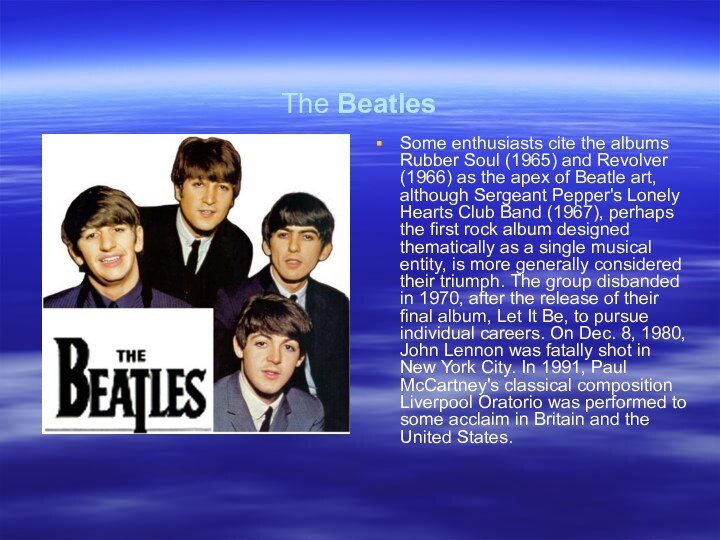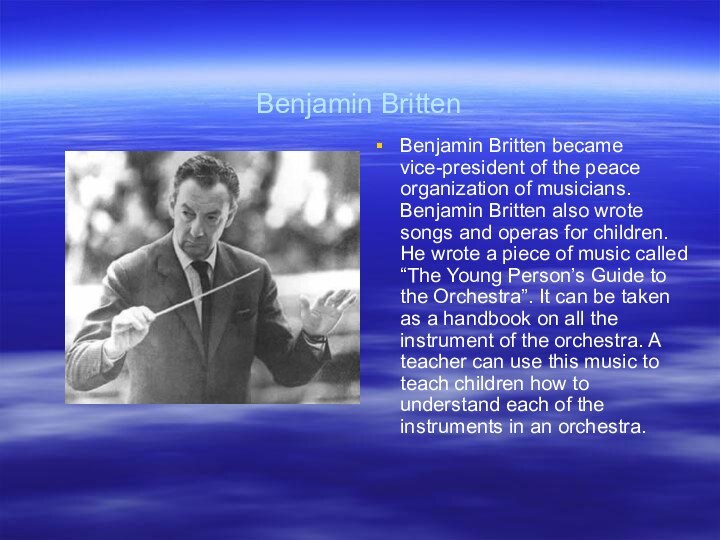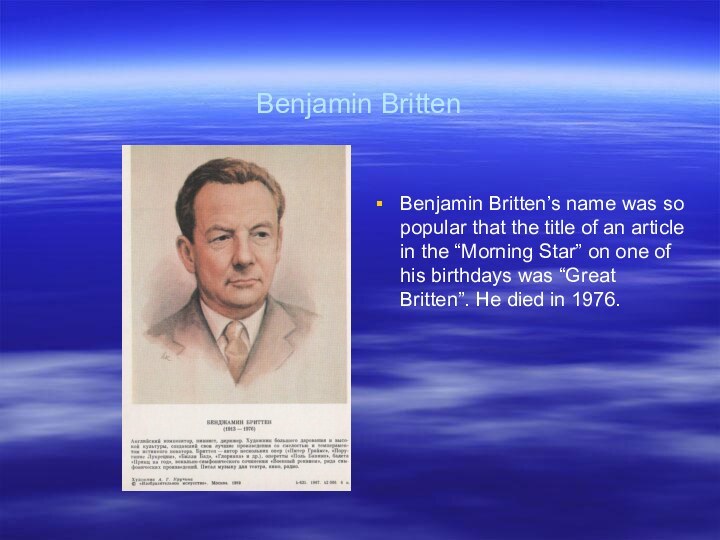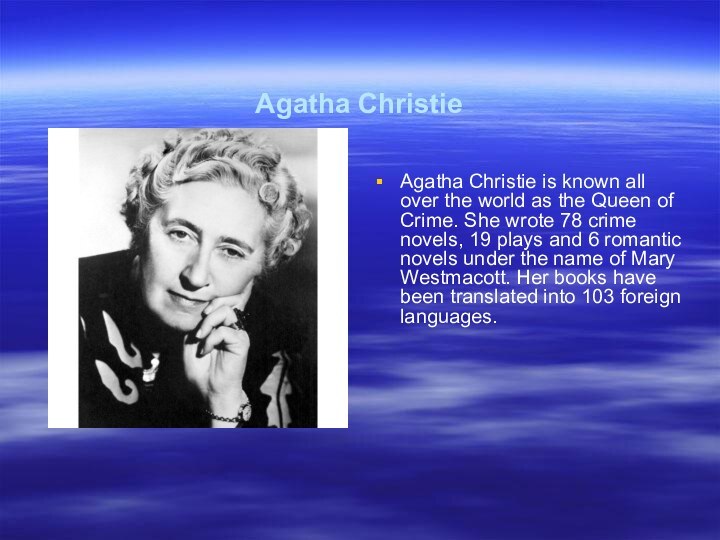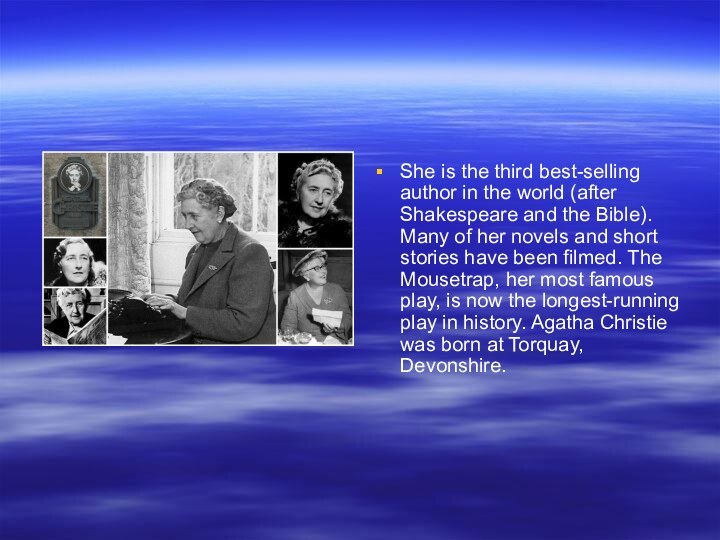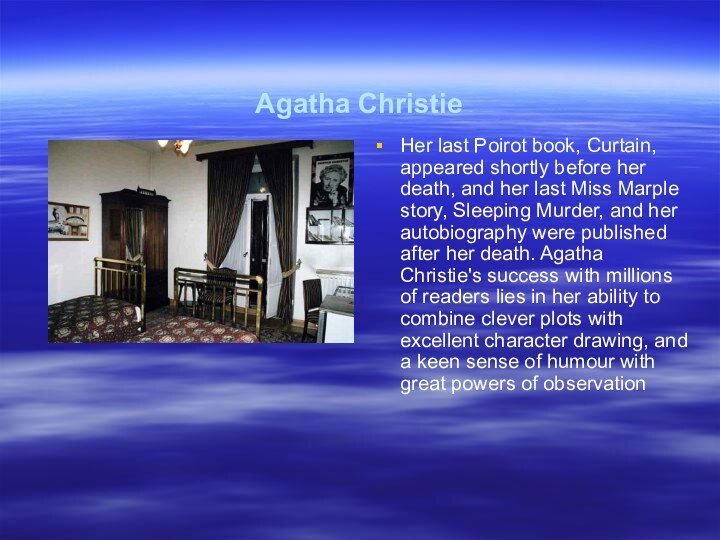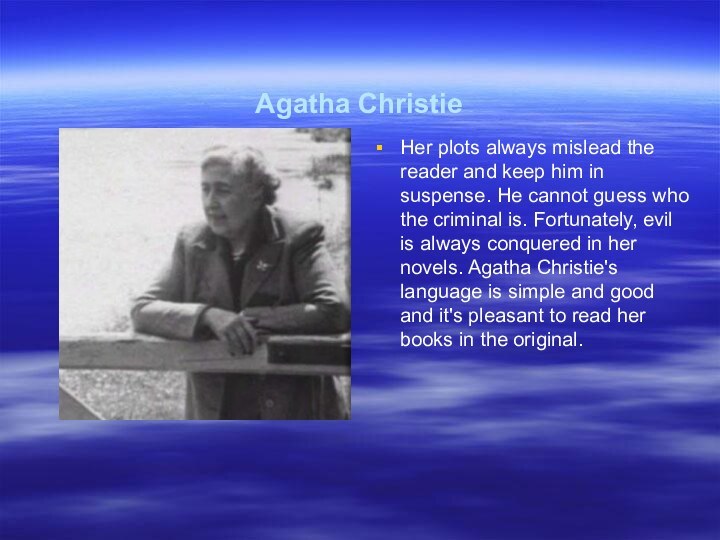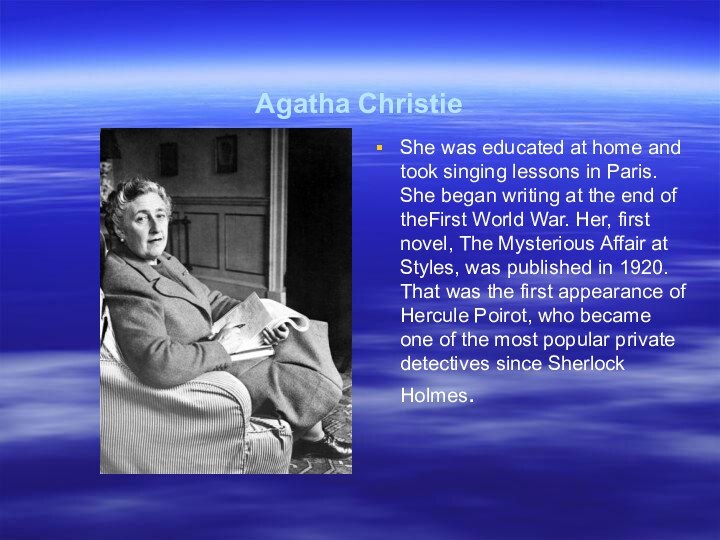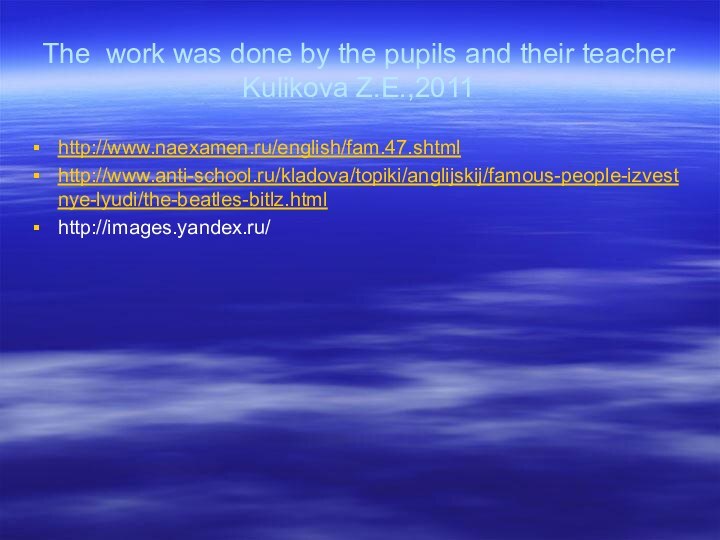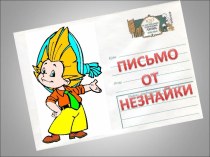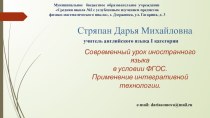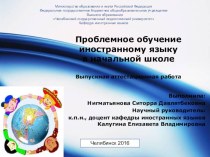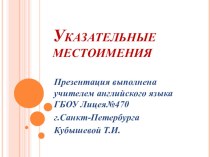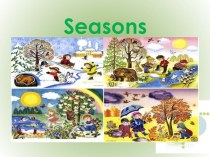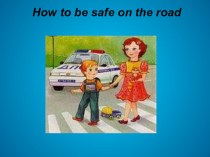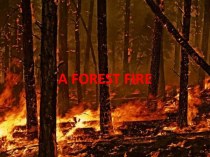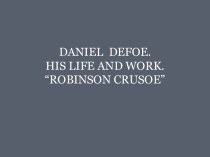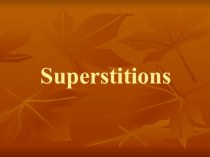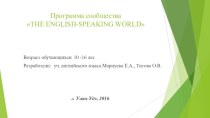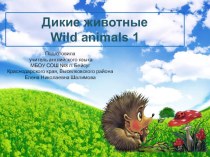Слайд 2
There are many outstanding people in Great Britain.
Britain produced statesmen, thinkers, explorers, musicians, writers, scientists and
other people who are well known around the world
Слайд 3
Isaac Newton
Isaac Newton one of the greatest men
in the history of science was born in a
little village in the middle of the 17th century. He studded math at Cambridge University. Newton's contribution to physics astronomy and math is so great that, he may be considered the founder of the mordent mathematics and physics.
Слайд 4
Charles Darwin
Charles Darwin was born in the beginning
of the 19th century. He was a great biologist.
He created a new theory of evolution. Once there were only simple organisms living in the seas, hundreds millions of years they have developed to produce all the different kind animals and plants we knew today.
Слайд 5
Charles Darwin
He discovered the law of motion and
the universal law of gravitation. He studded the nature
of light and colour and came to the conclusion that white colour consists of many different colours known as spectrum. He died when he was 84 and was burred at Westminster Abbey .
Слайд 6
Michael Faraday
Michael Faraday was born at the end
of the 17th century. He was interested in electricity
very much and spent long months studding this strange force. He discovered that electricity passed from the magnet to the wires and cowbell become a strong electric current. So he opened many laws of electricity and magnetism.
Слайд 7
Rutherford
Lord Rutherford the great pioneer of nuclear physics
received the Nobel Prize in 1908 for his investigations
into decay of elements chemistry of radiated substances.
Слайд 8
Alexander Fleming
Alexander Fleming discovered penicillin in 1929.
Слайд 9
William Shakespeare
William Shakespeare, the greatest and most famous
of English writers, and probably the greatest playwright who
has ever lived, was born on the 23d of April, 1564, in Stratford-on-Avon. In sprite of his fame we know very little about his life. At the age of six he was sent to school, but had to leave it at the age of 13. His father, John Shakespeare, was a glove-maker, and when he fell into debt, William had to help him in the trade. Just what William did between his fourteenth and eighteenth years isn’t known.
Слайд 10
William Shakespeare
At the age of eighteen, he married
Anne Hathaway. Ann was eight years older than her
husband and the marriage wasn’t a happy one. When Shakespeare was twenty-one, he went to London. We don’t know why he left Stratford-on-Avon. There is a story that Shakespeare’s first job in London was holding rich men’s horses at the theatre door. But nobody can be sure that this story is true. Later, Shakespeare became an actor and a member of a very successful acting company.
Слайд 11
William Shakespeare
It’s highly probable that The Comedy of
Errors, Romeo and Juliet and some other plays by
Shakespeare were performed for the first time on this stage. Very soon, however, the actors were told that could no longer use the land that their theatre was built on and the company had nowhere else to perform. There is a story that in the dead of night the whole acting troop took down their theatre, timber by timber, brick by brick. They carried it across the river and rebuilt it. The new theatre was called the Globe. Shakespeare’s Globe was rather different from modern theatres .
Слайд 12
William Shakespeare
The plays were performed in the open
air and the audience got wet if it rained.
There was no scenery, very few props, and the only lighting was the daylight that came from the open roof above. Women in those days weren’t allowed to act in public and all the parts (even Juliet!) were played by men. Much of the audience stood to watch the performance and moved around, talking with each other and throwing fruit at the stage if they didn’t like something.
Слайд 13
William Shakespeare
Shakespeare wrote 37 plays: 10 tragedies (such
as Hamlet, King Lear, Othello, Macbeth), 17 comedies (such
as As You Like It, Twelfth Night, Much Ado About Nothing), 10 historical plays (such as Henry 4, Richard 3). He also left 7 books of poems and sonnets.
Слайд 14
William Shakespeare
William Shakespeare died at the age of
52 and was buried in fine old Parish Church
in Stratford-upon-Avon.
Слайд 15
Margaret Thatcher
Margaret Thatcher was the longest Prime Minister
of the 20th century. Her style and her views
appealed to mane British people who had lost confidence in the welfare state and in the direction the nation had taken. In some ways she was the first genuine leader the nation had had since Churchill.
Слайд 16
Margaret Thatcher
Margaret Thatcher began her career in politics,
when she became a Conservative Member of Parliament. in
1979 she was elected as Britain's first woman Prime Minister.
Слайд 17
Margaret Roberts was born on 13 October 1925
Margaret Thatcher's birthplace, in Grantham
From the start, her
autocratic style earned her the nickname of "The Iron Lady". Her abrasive manner has attracted some criticism. During the Falklands War of 1982, however, Margaret Thatcher's militant patriotism found her many supporters, and she became something of a popular hero-figure, much as Winston Churchill had been in the Second World War. Margaret Thatcher was re-elected Prime Minister in the general elections of 1983 and 1987.
Слайд 18
The Beatles
The English ROCK MUSIC group The Beatles
gave the 1960s its characteristic musical flavor and had
a profound influence on the course of popular music, equaled by few performers. The guitarists John Winston Lennon, Oct. 9, 1940; James Paul McCartney, June 18, 1942; and George Harrison, Feb. 25, 1943; and the drummer Ringo Starr, Richard Starkey, July 7, 1940, were all born and raised in Liverpool. Lennon and McCartney had played together in a group called The Quarrymen. With Harrison, they formed their own group, The Silver Beatles, in 1959, and Starr joined them in 1962.
Слайд 19
The Beatles
As The Beatles, they developed a local
following in Liverpool clubs, and their first recordings, "Love
Me Do" (1962) and "Please Please Me" (1963), quickly made them Britain's top rock group. Their early music was influenced by the American rock singers Chuck BERRY and Elvis PRESLEY, but they infused a hackneyed musical form with freshness, vitality, and wit. The release of "I Want to Hold Your Hand" in 1964 marked the beginning of thephenomenon known as "Beatlemania" in the United States.
Слайд 20
The Beatles
The Beatles' first U.S. tour aroused a
universal mob adulation. Their concerts were scenes of mass
worship, and their records sold in the millions. Their first film, the innovative A Hard Day's Night (1964), was received enthusiastically by a wide audience that included many who had never before listened to rock music.
Слайд 21
The Beatles
Composing their own material (Lennon and McCartney
were the major creative forces),The Beatles established the precedent
for other rock groups to play their own music. Experimenting with new musical forms, they produced an extraordinary variety of songs: the childishly simple "Yellow Submarine"; the bitter social commentary of "Eleanor Rigby"; parodies of earlier pop styles; new electronic sounds; and compositions that were scored for cellos, violins, trumpets, and sitars, as well as for conventional guitars and drums.
Слайд 22
The Beatles
Some enthusiasts cite the albums Rubber Soul
(1965) and Revolver (1966) as the apex of Beatle
art, although Sergeant Pepper's Lonely Hearts Club Band (1967), perhaps the first rock album designed thematically as a single musical entity, is more generally considered their triumph. The group disbanded in 1970, after the release of their final album, Let It Be, to pursue individual careers. On Dec. 8, 1980, John Lennon was fatally shot in New York City. In 1991, Paul McCartney's classical composition Liverpool Oratorio was performed to some acclaim in Britain and the United States.
Слайд 23
Benjamin Britten
Benjamin Britten (Engish composer)
Benjamin Britten was a
famous English composer whose name is known in many
countries of the world. He was born in the 1913. He was only five when he started to play the piano and compose music. By the time he was nineteen, he was already both a musician for a film company and a composer. He wrote music for the plays of several English writers. In 1962 Benjamin Britten finished a very big musical work: the “War Requiem”.
Слайд 24
Benjamin Britten
He wrote music for the plays of
several English writers. In 1962 Benjamin Britten finished a
very big musical work: the “War Requiem”.
Слайд 25
Benjamin Britten
Benjamin Britten became vice-president of the peace
organization of musicians. Benjamin Britten also wrote songs and
operas for children. He wrote a piece of music called “The Young Person’s Guide to the Orchestra”. It can be taken as a handbook on all the instrument of the orchestra. A teacher can use this music to teach children how to understand each of the instruments in an orchestra.
Слайд 26
Benjamin Britten
Benjamin Britten’s name was so popular that
the title of an article in the “Morning Star”
on one of his birthdays was “Great Britten”. He died in 1976.
Слайд 27
Agatha Christie
Dame Agatha Christie DBE DBE (15 September
1890 – 12 January 1976) was a British crime
writer DBE (15 September 1890 – 12 January 1976) was a British crime writer of novels DBE (15 September 1890 – 12 January 1976) was a British crime writer of novels, short stories DBE (15 September 1890 – 12 January 1976) was a British crime writer of novels, short stories, and plays DBE (15 September 1890 – 12 January 1976) was a British crime writer of novels, short stories, and plays. She also wrote romances under the name Mary Westmacott /
Слайд 28
Agatha Christie
Agatha Christie is known all over the
world as the Queen of Crime. She wrote 78
crime novels, 19 plays and 6 romantic novels under the name of Mary Westmacott. Her books have been translated into 103 foreign languages.
Слайд 29
She is the third best-selling author in the
world (after Shakespeare and the Bible). Many of her
novels and short stories have been filmed. The Mousetrap, her most famous play, is now the longest-running play in history. Agatha Christie was born at Torquay, Devonshire.
Слайд 30
Agatha Christie
Agatha Christie became generally recognised in 1926,
after the publishing of her novel The Murder of
Roger Ackroyd. It's still considered her masterpiece. When Agatha Cristie got tired of Hercule Poirot she invented Miss Marple, a deceptively mild old lady with her own method of investigation.
Слайд 31
Agatha Christie
Her last Poirot book, Curtain, appeared shortly
before her death, and her last Miss Marple story,
Sleeping Murder, and her autobiography were published after her death. Agatha Christie's success with millions of readers lies in her ability to combine clever plots with excellent character drawing, and a keen sense of humour with great powers of observation
Слайд 32
Agatha Christie
Her plots always mislead the reader and
keep him in suspense. He cannot guess who the
criminal is. Fortunately, evil is always conquered in her novels. Agatha Christie's language is simple and good and it's pleasant to read her books in the original.
Слайд 33
Agatha Christie
She was educated at home and took
singing lessons in Paris. She began writing at the
end of theFirst World War. Her, first novel, The Mysterious Affair at Styles, was published in 1920. That was the first appearance of Hercule Poirot, who became one of the most popular private detectives since Sherlock Holmes.
Слайд 34
Agatha Christie's gravestone in Cholsey
Agatha Christie died
on 12 January 1976 at age 85 from natural
causes at her WinterbrookAgatha Christie died on 12 January 1976 at age 85 from natural causes at her Winterbrook House in the north of CholseyAgatha Christie died on 12 January 1976 at age 85 from natural causes at her Winterbrook House in the north of Cholsey parishAgatha Christie died on 12 January 1976 at age 85 from natural causes at her Winterbrook House in the north of Cholsey parish, adjoining WallingfordAgatha Christie died on 12 January 1976 at age 85 from natural causes at her Winterbrook House in the north of Cholsey parish, adjoining Wallingford in Oxfordshire (formerly part of Berkshire). She is buried in the nearby churchyard of St Mary's, Cholsey.
